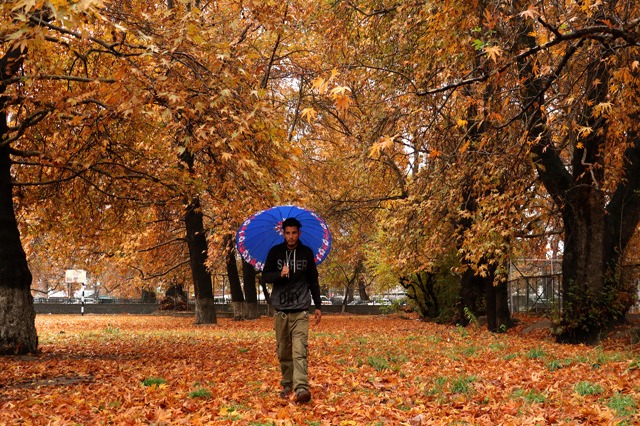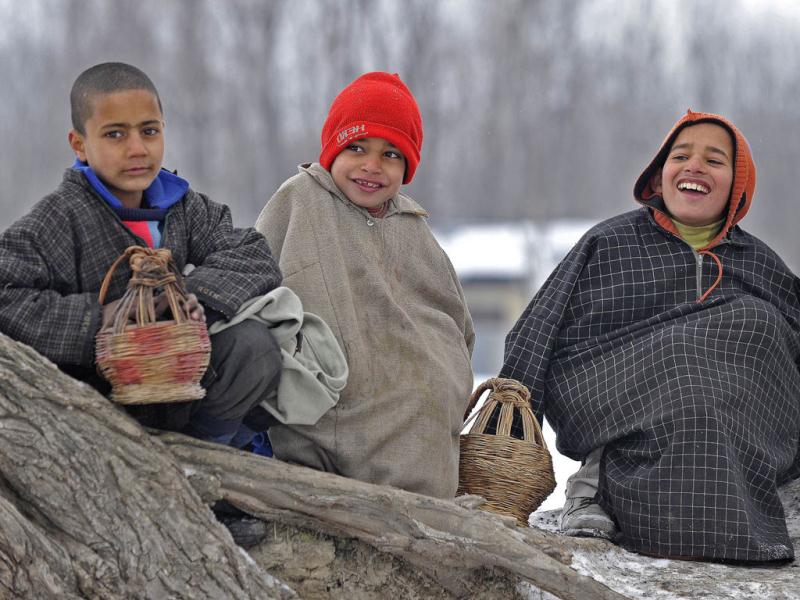Harud (autumn), rud’d jarri (sheets of rain) and the coy advances of wand’e (winter), all put together, make Kashmir (a blessed home) what it has always been (since I have known it) around October, each year, almost always, surprising us each day. The winds blow over Jhelum. The leaves, already yellow and dead, fall. We think it might snow. It rains. In the streets men and women walk like perfect strangers. They hold their umbrellas aloft. They look up, look down, holding their gaze on ground, jump over a puddle and walk. Occasionally a young man stops over, lights a cigarette and feebly releases dense rings of smoke.
Somewhere, in the house on the riverbank, a grandmother suddenly realises it has stopped raining. The sound of rain falling on the metal in the courtyard ebbs down. The sky turns blue in places where the clouds drift westward. Then there’s an invasion of ephemeral white light which entertains the possibility of a clear, breezy day. We think, now, it might not rain. The cooing of birds perched on the Chinars is complacent. It’s music. Or, perhaps, jazz.
The windows are thrown open. And, in less than a minute, the pouring of rain on metal startles us. The windows are shut violently. Outside, in the streets, men and women run for covers. It begins to rain again. Thus, Kashmir, in the last days of Harud completes and repeats the disorder of life we live, in quick repetitive cycles.

Then precisely a day before it snows. The feeling that you might wake up to snow tomorrow (overwhelms you) and all you would do all day long is (you tell yourself) sit on the window sill and look towards the sky (white upturned saucer, porcelain veneer) and watch snowflakes twirl down and accumulate in the courtyard, then look up again and, in a childlike excitement, wonder and ask yourself: does sky not look lot closer than an imagined heaven which, you think, you will cajole into letting you inside (for real) even if for a passing moment?
Is not the window, in that moment, being pulled, almost vertically, by a force stronger than gravity into whatever mysteries are tucked away in the sky? And then the anticipation of finding out and sneaking a look at wherever all the snow and rain and light falls from on earth?
That feeling, very stupid, I acknowledge – how beautiful though. It’s however, and will remain so (forever), overpowering in winters.
On the day it’s snowing, you can’t say if it’s white anymore. It’s pitch dark outside. The dark, of sorts, which could blind you. The dark of sorrow which stirs an emotion in you (of immense sadness) you can only relate to the funeral of a young man who dies in autumn.
Throughout the evening though, occasionally looking out through that window (sitting on the cold window sill) to see how much snow has accumulated in the courtyard, and sleeping into the night, like a cat, with extreme caution, Kashmir would wake up to an explosion of white light and, in awe, it would run in snow in a remote meadow and, for a fleeting moment, feel happy and announce the season’s first snowfall.

However, dusk would fall sooner and truce time over, it’d confront its existential sorrow and, in that sense, if the snow is still falling, it’d wonder if it’s white anymore.
A sad memory of winter, from my childhood, so overwhelming that as it makes its way to me, past all the clutter of monotony, my stomach aches, I turn cold. It explains partly why I relate winter to grief than the usual joy and warmth.
A mountain of snow would accumulate behind the house (for weeks altogether) after skiding from the roof (and freeze into ice eventually) and, as kids, we’d go out when the sun would come on (in the afternoon) with shovels and hoes and dig tunnels in the hardened snow. This was how we were making igloos, we thought.
We would sit inside the miniature tunnels – the eskimos – and look on, in the warmth of winter sun, dazed by the white light. In the late afternoon, it would begin snowing again. The winter sun is flippant. It is a phenomenon that dissipates way too quickly. What did grief mean to us as kids? This dissipation, this going away of winter sun when it would have to stay on, should have stayed on and didn’t. My heart would grow heavy. The face would contort into a shape of commotion. Grief didn’t have a word. It was (in the pure innocence of childhood) a feeling which was terribly sad, a feeling I have always associated with winter. We’d retreat into cold shadows of the house. The doors (behind us) would shut close.
Before herding us in the room with green windowpanes (asking us to stay quiet in there, under the quilts) we’d be called for the last round of evening tea. Once over, we’d make inroads to the room assigned to us (in winters) which I always likened to a gas chamber somehow.
It was warm and damp. It strangely smelled of ancient sleep. What did we do there? Either, in the day, we’d write school assignments for winter. Or, as it would grow darker, we would sing cheerful songs and sleep.
Close to the evenings, before the third call for prayer was said, we would fill our tiny kanged (firepots woven in wicker) with embers (from the hearth) to the brim and wrap ourselves in our pherans.

Unwary of the ticking of time, in the alphabets of our snow poems we would think of writing in the day, we would doze off. At dinner we would wake up. With no electricity, with no other source of entertainment, the radio noise drowned the drawing room (where the family also ate) in its shrill melody.
Father skimmed through the obscure frequencies on MW until, as it happened, with hope and patience he would locate VOA Urdu and Radio Pakistan. It was bit of a struggle, I understood. To step onto a desired frequency broadcasted from somewhere else (you think of lat/long) one has to hear the rustle of Indian and Russian radio stations a nuisance one would always want to get rid of, I learnt much later.
VOA Urdu was always cheerful, a happy memory from winter. It always had a nostalgic effect on me. I have unsuccessfully shamelessly mimicked the newsreader. However, it did not occur to me (has not occurred to me as yet) I can’t simulate the radio voices I listened to on my father’s radio. I still, at times, try and mimic (from memory) voices I have listened to on the radio over the years. I simply refuse to give up on my hidden talent.
The waking up, to eat dinner, was not so much of an effort as was waking up in the mornings. We would never believe that a metaphor for the absurdity called happiness, we slept to in the poem, has brought us back to life. We would eat dinner in haste. A ritualistic exercise (we undertook in winter only) followed dinner: savouring oranges. The oranges were boiled in a cauldron (over hearth) so that the frost, inside the pulp, would dissolve in the water seething, at hundred degree Celsius. We’d wait.
Then they would be distributed among us, the children of the house. We’d skin oranges inside our pherans. Not looking at each other, we thought, wouldn’t compel us, in any way, to share pieces of oranges. I always finished last. So, always, while eating oranges, I would rather stay low. So would others, to my surprise. It was perhaps an unsaid pact. This is a happy memory. A rarity in its own way.
And right after that, each one of us would return to the poem, awaiting us, in sleep.
Like this story? Producing quality journalism costs. Make a Donation & help keep our work going.








